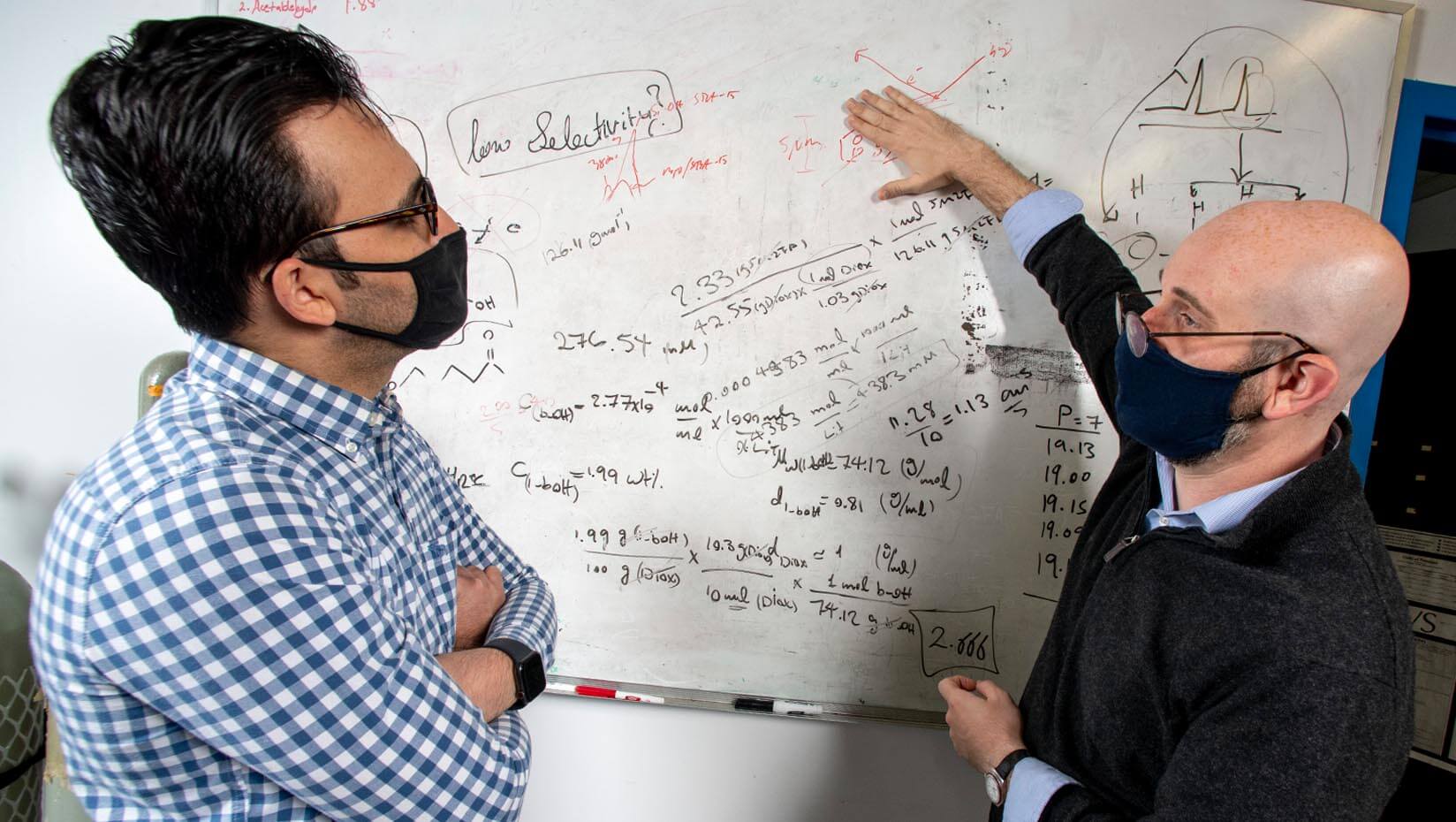
NSF CAREER award supports Schwartz’s research on the chemical process for making rubber component
Delving deeper into the chemical processes used to make various goods from biomass can help manufacturers use them with greater efficiency, and therefore, increase production. Thomas Schwartz aims to unravel the inner workings of a common method for crafting a compound for rubber known as butadiene, an effort backed by the National Science Foundation.
The assistant professor of chemical engineering at the University of Maine received a $513,995 NSF CAREER Award to advance his ongoing dissection of the Lebedev process. The well-known, multi-step chemical reaction is used to make butadiene from biomass-derived ethanol. However, little research has been conducted on the Lebedev process at the molecular level.
Understanding the intricacies of the process would help researchers create new catalysts, which are necessary for the chemical reactions to make goods from both petroleum and biomass, that would increase butadiene yield. The emergence of improved catalysts could help grow the development of biobased, renewable chemicals.
“Synthetic rubber is used in all sorts of consumer products, from car tires to paper coatings. Our goal is to enable production of synthetic rubber from renewable resources,” Schwartz says.
The new study builds on the previous research conducted by Schwartz and his UMaine Catalysis Group. He founded the group in 2015 to explore the intricacies of catalysts and the roles they play in chemical reactions used to make fuels and chemicals from carbon-based feedstocks.
Hussein Abdulrazzaq, a former Ph.D. student from Schwartz’s lab who graduated last year, previously led a group of fellow scholars and researchers in a study into the first step of the Lebedev process: converting ethanol to acetaldehyde and ethylene using magnesia-silica as a catalyst. The team discovered the mechanism that converts ethanol to acetaldehyde and ethylene, becoming first researchers to pinpoint and report it for that catalyst.
Schwartz’s latest study, funded by the NSF CAREER Award, will discern the chemical mechanism by which butadiene is produced from ethanol. The UMaine chemical engineer also aims to deduce the point in the reaction at which carbon-carbon bond formation occurs. According to him, “the literature is conflicted about the (carbon-carbon) coupling mechanism and nature of the requisite active sites, which we seek to clarify.”
Testing the hypothesis will require Schwartz and his team to first identify the chemical steps in the Lebedev process that influence the production of butadiene by measuring rates of reaction using model magnesia-silica catalysts. Researchers must then use spectroscopy to characterize the model catalysts and determine the requirements for producing butadiene.
The end result of this research will be a series of molecular-level descriptions of how the reactions occur on the industrial catalysts. These kinds of descriptions are important for designing next-generation Lebedev catalysts.
“Our approach is to make careful measurements of reaction kinetics and use those to develop molecular-level insight into chemical reactions,” Schwartz says.
Despite playing a crucial role in the Lebedev process, magnesia-silica is complex and produces small quantities of butadiene, a problem when trying to expand the market. Schwartz’s research will provide other scientists the information they need to create new catalysts that could be used for the process and produce more butadiene than magnesia-silica.
The study also will help Schwartz and his colleagues create new course modules about biobased chemical production and catalytic reactor design for undergraduate students, and a biomass-to-chemicals module for high school students and the public.
“An important part of the work we do is to not only to improve our understanding of chemical processes but also to educate the next generation of engineers and scientists who can continue this work in the future,” Schwartz says.
Contact: Marcus Wolf, 207.581.3721; marcus.wolf@maine.edu
